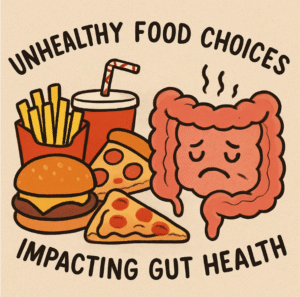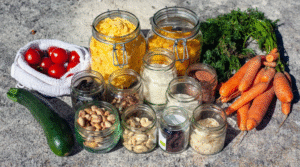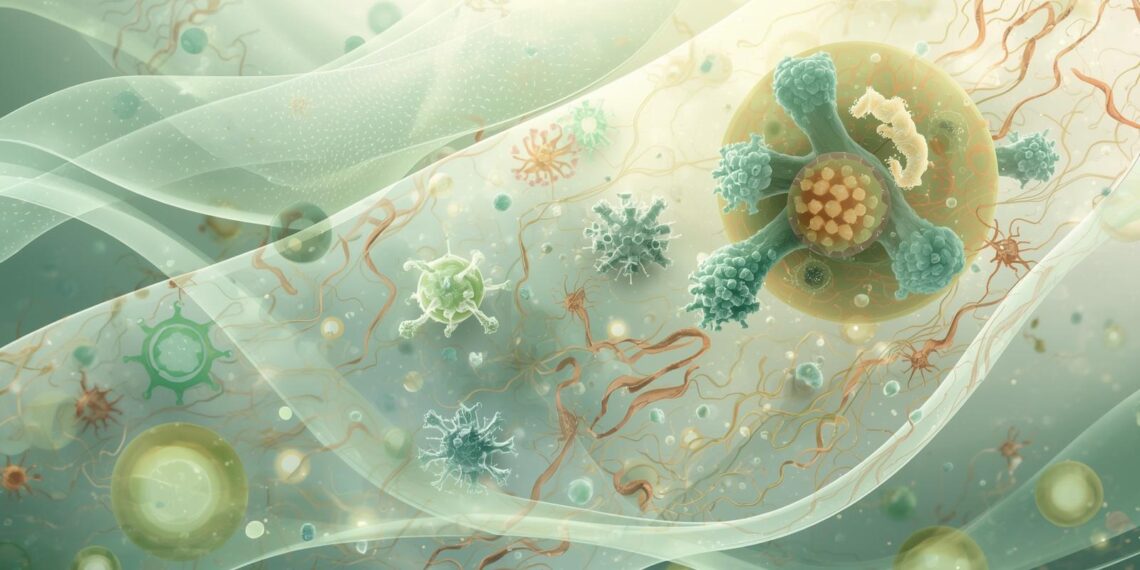Gut health refers to the function and balance of bacteria in the many parts of the gastrointestinal tract. A healthy gut contains a diverse community of microbes that work together to maintain optimal digestive health. However, when the balance of these microbes is disturbed, it can lead to digestive issues, inflammation, and other health problems.
The Role of Gut Bacteria
Gut bacteria are essential for breaking down complex carbohydrates, producing short-chain fatty acids, and synthesizing essential nutrients. They play a crucial role in maintaining the integrity of the gut lining and preventing harmful pathogens from entering the bloodstream. An imbalance in gut bacteria can compromise these functions, leading to adverse health effects.
Gut bacteria are not only involved in digestion but also play a role in synthesizing vitamins such as B12 and K, which are crucial for energy production and blood clotting. They also help in metabolizing bile acids, which are vital for fat digestion. Disruption in these processes can lead to nutritional deficiencies and metabolic disorders.
Moreover, gut bacteria communicate with the immune system, helping to train it to recognize harmful pathogens and differentiate them from the body’s own cells. An imbalance can lead to a hyperactive immune response, resulting in inflammation and autoimmune diseases.
The Impact on Mental Health
The gut-brain axis is a bidirectional communication system between the gut and the brain. Gut bacteria produce neurotransmitters like serotonin and dopamine, which are essential for mood regulation. An imbalance in the microbiome can lead to mood disorders such as depression and anxiety.
Research has shown that gut health can influence mental health, affecting our stress levels, anxiety, and even conditions like depression. A disrupted microbiome may lead to the production of neurotoxins or the reduction in beneficial neurotransmitters, influencing brain health.
Additionally, gut bacteria can affect the brain’s response to stress by modulating the hypothalamic-pituitary-adrenal (HPA) axis. An imbalanced microbiome can lead to an exaggerated stress response, contributing to chronic stress and mental health issues.
The connection between gut health and mental health has led to the exploration of psychobiotics, which are probiotics that may improve mental health by influencing the gut-brain axis. This emerging field highlights the importance of maintaining a balanced microbiome for mental well-being.
Causes of Microbiome Imbalance
Several factors can disrupt the delicate balance of the gut microbiome, leading to various health issues.
Diet and Nutrition
A diet high in processed foods, sugar, and unhealthy fats can negatively impact gut health. These foods promote the growth of harmful bacteria while reducing the diversity of beneficial microbes. Conversely, a diet rich in fiber, fruits, vegetables, and fermented foods supports a healthy microbiome.
Processed foods often lack the fiber necessary to feed beneficial gut bacteria, leading to their decline. The consumption of artificial additives and preservatives can further disrupt the gut ecosystem, promoting the growth of harmful bacteria and yeast.
Sugar and unhealthy fats can increase the production of endotoxins, which are harmful substances that can trigger inflammation and damage the gut lining. This can lead to conditions such as leaky gut syndrome, where toxins and pathogens leak into the bloodstream, causing systemic inflammation.
Conversely, a diet rich in diverse plant fibers can support a healthy microbiome by promoting the growth of beneficial bacteria that produce anti-inflammatory compounds. Fermented foods like yogurt, kimchi, and sauerkraut are also rich in probiotics, which can help replenish the microbiome.

Antibiotics and Medications
Antibiotics are designed to kill harmful bacteria, but they can also wipe out beneficial bacteria in the gut. This can lead to a decrease in microbial diversity and an increase in antibiotic-resistant strains. Other medications, such as nonsteroidal anti-inflammatory drugs (NSAIDs) and proton pump inhibitors (PPIs), can also affect gut health.
The overuse of antibiotics is a significant concern, as it can lead to long-term alterations in the gut microbiome, making it more susceptible to infections and diseases. Antibiotic resistance is a growing problem, and the disruption of the microbiome can contribute to the emergence of resistant strains.
Medications like NSAIDs can damage the gut lining, leading to increased intestinal permeability and inflammation. Similarly, PPIs, used to reduce stomach acid, can alter the gut environment, affecting the balance of bacteria and increasing the risk of infections.
It’s crucial to use antibiotics and medications judiciously, only when necessary and prescribed by a healthcare professional, to minimize their impact on the gut microbiome and overall health.
Stress and Lifestyle
Chronic stress has been shown to alter the composition of gut bacteria, leading to an imbalance. Lifestyle factors such as lack of sleep, excessive alcohol consumption, and smoking can further exacerbate this issue.
Stress can lead to the release of stress hormones like cortisol, which can alter the gut environment and affect bacterial growth. Chronic stress can also lead to changes in gut motility and increase intestinal permeability, allowing harmful substances to enter the bloodstream.
Lack of sleep can disrupt the body’s natural circadian rhythms, affecting the gut microbiome’s composition and function. Sleep deprivation can lead to an increase in inflammatory markers and a decrease in beneficial bacteria, impacting overall health.
Alcohol and smoking are known to have a detrimental effect on gut health, promoting inflammation and altering the balance of gut bacteria. Limiting these lifestyle factors and incorporating stress management techniques can support a healthy microbiome.
Environmental Factors
Exposure to environmental pollutants and toxins can also disrupt the microbiome. These substances can alter the composition and function of gut bacteria, leading to health problems.
Pollutants such as heavy metals, pesticides, and chemicals can accumulate in the body, affecting the gut microbiome’s balance and leading to inflammation and disease. These toxins can disrupt the production of beneficial compounds by gut bacteria, impacting overall health.
Air pollution has been linked to changes in the gut microbiome, increasing the risk of inflammatory diseases and metabolic disorders. Reducing exposure to environmental toxins through lifestyle changes and supporting detoxification pathways can help maintain a healthy microbiome.
Water quality is another crucial factor in maintaining gut health. Contaminated water can introduce harmful pathogens and toxins into the gut, leading to imbalances and health issues. Ensuring access to clean water is essential for supporting a balanced microbiome.
Solutions for Restoring Microbiome Balance
Maintaining a balanced microbiome is crucial for overall health. Here are some strategies to restore and maintain gut health:
Probiotics and Prebiotics

Probiotics are live microorganisms that can confer health benefits when consumed in adequate amounts. They help replenish beneficial bacteria in the gut and restore balance. Prebiotics, on the other hand, are non-digestible fibers that feed beneficial bacteria. Including both probiotics and prebiotics in your diet can support a healthy microbiome.
Probiotics can be found in supplements and fermented foods like yogurt, kefir, and kombucha. They can help restore the balance of gut bacteria, particularly after antibiotic use, and improve digestive health. Different strains of probiotics have specific benefits, so it’s important to choose the right ones for your needs.
Prebiotics are found in foods like garlic, onions, leeks, asparagus, and bananas. They serve as food for beneficial bacteria, promoting their growth and activity. Incorporating a variety of prebiotic-rich foods in your diet can enhance the effects of probiotics and support a diverse microbiome.
Combining probiotics and prebiotics can create a synergistic effect, known as synbiotics, which can provide enhanced benefits for gut health. Including both in your diet can help maintain a balanced microbiome and improve overall health.
Dietary Adjustments
Adopting a diet that emphasizes whole, unprocessed foods can promote gut health. Incorporating a variety of fruits, vegetables, whole grains, and fermented foods such as yogurt, kefir, and sauerkraut can help maintain a diverse microbiome. Reducing the intake of processed foods, sugar, and unhealthy fats is equally important.
Whole foods are rich in essential nutrients and fibers that support the growth of beneficial bacteria. A diverse diet can provide different types of fibers and compounds that promote microbial diversity and resilience, supporting overall health.
Fermented foods are a natural source of probiotics, which can help replenish beneficial bacteria in the gut. Including a variety of fermented foods in your diet can enhance the diversity and function of the microbiome, improving digestive health and immune function.
Avoiding processed foods and artificial additives can prevent the growth of harmful bacteria and reduce inflammation. Cooking at home and choosing organic, whole ingredients can help maintain a healthy microbiome and support overall well-being.
Stress Management
Chronic stress can negatively impact gut health, so finding effective ways to manage stress is essential. Practices such as mindfulness, meditation, yoga, and regular physical activity can help reduce stress levels and promote a healthy gut.
Mindfulness and meditation can help reduce stress by promoting relaxation and enhancing emotional regulation. These practices can lower cortisol levels and improve the balance of gut bacteria, supporting overall health.
Yoga combines physical movement with breath control and meditation, providing a holistic approach to stress management. Regular yoga practice can improve flexibility, reduce stress, and enhance gut health by promoting microbial diversity.
Physical activity is an effective way to reduce stress and support gut health. Exercise can increase the production of short-chain fatty acids, which have anti-inflammatory properties and support a healthy gut lining. Incorporating regular physical activity into your routine can enhance overall well-being.
Limiting Antibiotic Use
While antibiotics are sometimes necessary, their overuse can harm the gut microbiome. It is important to use antibiotics judiciously and only when prescribed by a healthcare professional.
Discussing alternative treatments with your healthcare provider can help minimize antibiotic use and protect the gut microbiome. When antibiotics are necessary, taking probiotics alongside them can help maintain microbial balance and reduce side effects.
Educating yourself on the importance of gut health and the impact of antibiotics can empower you to make informed decisions about your health. Understanding when antibiotics are necessary and when alternative treatments may be appropriate is crucial for protecting your microbiome.
Supporting your immune system through a healthy diet, regular exercise, and stress management can help reduce the need for antibiotics and maintain a balanced microbiome.
Regular Exercise
Engaging in regular physical activity can enhance gut health by promoting microbial diversity. Exercise has been shown to increase the production of short-chain fatty acids, which have anti-inflammatory properties.
Incorporating different types of exercise, such as aerobic activities, strength training, and flexibility exercises, can provide comprehensive benefits for gut health. Each type of exercise can promote different aspects of well-being, supporting a balanced microbiome.
Exercise can improve gut motility and enhance digestion, reducing the risk of constipation and promoting regular bowel movements. Regular physical activity can also support immune function and reduce inflammation, contributing to a healthy gut environment.
Creating a balanced exercise routine that includes a variety of activities can help maintain a healthy microbiome and support overall health. Finding enjoyable forms of exercise can promote consistency and enhance long-term well-being.
The Future of Gut Health in Wellness
The wellness industry is increasingly recognizing the importance of gut health as a cornerstone of overall well-being. As more research emerges, there is a growing emphasis on personalized approaches to gut health, incorporating individual differences in microbiome composition and lifestyle factors.
Personalized Nutrition and Gut Health
The rise of personalized nutrition is transforming the way we approach gut health. By analyzing an individual’s microbiome, personalized nutrition plans can be developed to address specific imbalances and promote overall health.
Advancements in technology, such as microbiome testing, allow for a deeper understanding of individual gut health. These tests can provide insights into the composition and function of the microbiome, guiding personalized dietary and lifestyle recommendations.
Personalized nutrition can help individuals achieve optimal health by addressing specific needs and imbalances. Tailored plans can include specific foods, supplements, and lifestyle changes that support a balanced microbiome and enhance well-being.
Gut Health and Mental Wellness
The connection between gut health and mental wellness is gaining attention in the wellness industry. Understanding the gut-brain axis and its impact on mental health can lead to innovative approaches to managing mental health conditions.
Psychobiotics, probiotics that influence the gut-brain axis, are an emerging area of research with potential benefits for mental health. These probiotics can improve mood, reduce anxiety, and support emotional well-being by enhancing gut health.
Integrating gut health strategies into mental health care can provide a holistic approach to treatment. Addressing the microbiome alongside traditional therapies can enhance outcomes and support overall mental wellness.
Innovations in Gut Health Products
For wellness product developers, the focus on gut health presents opportunities for innovation. Developing products that cater to personalized gut health needs can meet the growing demand for targeted solutions.
Probiotic supplements, synbiotics, and prebiotic-rich foods are just some of the products that can support gut health. Innovations in formulation and delivery methods can enhance the effectiveness and appeal of these products.
Collaboration between researchers, healthcare professionals, and product developers can lead to the creation of cutting-edge gut health solutions. By staying informed about the latest research and trends, developers can create products that meet consumer needs and support overall wellness.
Conclusion
Understanding the causes and solutions for microbiome imbalance is crucial for anyone invested in their health and well-being. By making informed lifestyle choices and incorporating evidence-based practices, individuals can support a balanced microbiome and enjoy the myriad benefits it brings. As we continue to unravel the complexities of the gut microbiome, its role in wellness will undoubtedly remain a focal point in both scientific research and consumer interest.
In a world where wellness trends are constantly evolving, the importance of maintaining a healthy microbiome cannot be overstated. Whether you’re a product developer, magazine editor, or wellness coach, understanding and addressing microbiome balance is key to staying ahead in the wellness industry.
By prioritizing gut health, individuals can enhance their physical and mental well-being, supporting a vibrant and healthy life. As research continues to advance, the insights gained will pave the way for innovative solutions and a deeper understanding of the microbiome’s impact on health.
Ultimately, the journey to a balanced microbiome is a personal one, influenced by individual lifestyle factors and health needs. By embracing a holistic approach to health that includes diet, stress management, and exercise, individuals can cultivate a thriving microbiome and unlock their full potential for well-being.




